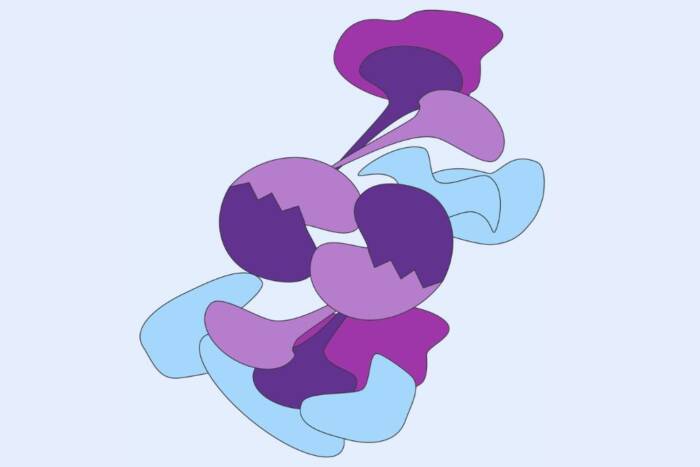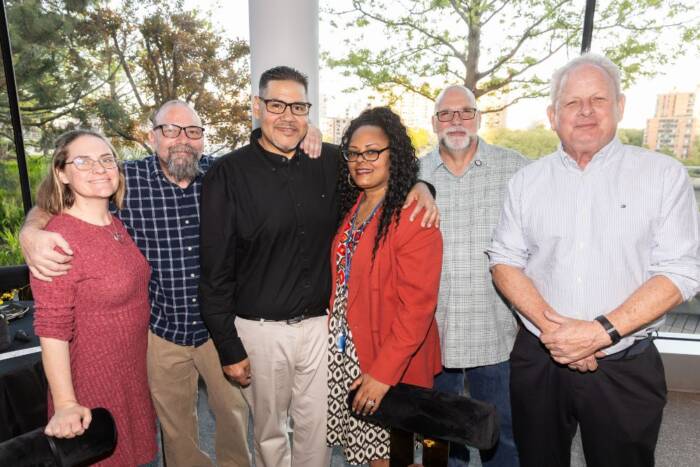"Stressed out" by living and working in NYC?
Experts on stress will speak on April 29, at Rockefeller Univ. lecture for public
Car alarms. Traffic jams. Job layoffs. These almost daily events are among the reasons that New Yorkers often feel stressed out. But while many people can identify what triggers their stress, they may not understand how it affects their bodies and what they should do to cope. Answers to these and other questions will be discussed by experts at a public lecture titled “Stress: A New York State of Mind,” at 7 p.m., Tuesday, April 29, in Rockefeller University’s Caspary Auditorium (York Avenue at East 66th Street).
The lecture will feature a moderated panel discussion involving Rockefeller University’s Bruce McEwen, Ph.D., a leading authority on stress and its effects on the brain and body; Barrie Cassileth, Ph.D., chief of the Integrative Medicine Service in the Department of Medicine at Memorial Sloan-Kettering Cancer Center; and Samuel Mann, M.D., associate professor of clinical medicine at the Hypertension Center of the NewYork-Presbyterian Hospital Weill Cornell Medical Center. At Rockefeller, McEwen is Alfred E. Mirsky Professor and head of the Harold and Margaret Milliken Hatch Laboratory of Neuroendocrinology.
According to McEwen, who co-authored the recently published book The End of Stress as We Know It, people who understand the physiological underpinnings of stress — also known as “allostatic load” — can actually learn how to live in a way that will limit the health damage it can cause.
“We have to learn how to recognize when we’re getting that ‘stressed out’ feeling and be able to stop it in its tracks,” McEwen says. “As we come to understand more and more about the body’s normal stress response, it becomes increasingly apparent that the best way to deal with stress is by staying physically and emotionally healthy. To do that, each one of us must take a hard, long look at our lifestyles.”
McEwen’s laboratory research on stress in rodents at Rockefeller University has shown that chronic, long-term stress has devastating consequences on the brain: the area of the brain responsible for learning and memory, the hippocampus, shrinks, while the brain’s center for fear and anxiety, the amygdala, grows. These findings also have been observed in humans.
But at the same time, McEwen’s research has revealed that acute, or short-term, stress can actually benefit the individual, because the hormones released during an acute stress response may help prepare the body’s immune system for a potential challenge, such as wounding or infection. In such beneficial situations, stress perception by the brain serves as an early warning signal to the immune system. Stress hormones also acutely can improve memory for important experiences and enhance the body’s ability to mobilize energy resources.
Mann says that the impact of stress medically includes both direct and indirect effects. Direct effects of stress are emotional distress and somatic symptoms (tension headaches, insomnia, overeating), while indirect effects result from overeating and increased smoking and drinking of alcoholic beverages.
“Are there direct effects of stress that cause medical conditions?” he says. “Will stress trigger or worsen heart attacks, high blood pressure or inflammatory bowel disease?”
Mann, who will answer these questions at the Rockefeller event, adds that people respond to stress both consciously and unconsciously. “It’s not necessary for us to realize that we are ‘stressed out’ for the stress to affect us negatively. The stress that we don’t consciously realize can hurt us,” he says. “There can be serious medical consequences such as hypertension, and possibly chronic fatigue, fibromyalgia and chronic insomnia.”
But while stress has impact on health, can it cause cancer? “This is the era of stress causing everything in the world. It’s very unfortunate,” says Cassileth. “There certainly is a mind-body link, but I don’t think the mind causes cancer and I don’t think the mind can cure it.”
Since stress is a normal part of life — particularly in New York City — what is the best way to cope with it? According to Cassileth, during a lifetime of reacting to stressful situations, we develop both automatic and intentional means of reacting to difficulties.
“Common and usually helpful reactions include temporary denial, connecting spiritually or with loved ones, and reaching out to others in need,” Cassileth says. “Probably universally beneficial are managing uncertainly by imposing structure, and interacting with others.”
Among the therapies that Cassileth has found beneficial for relieving the stress that people with cancer and their families often experience are massage therapies, music therapy, meditation and other relaxation techniques, acupuncture and hypnosis. She also counsels patients about herbal remedies and food supplements.
Stress, Cassileth says, is dangerous when it is extreme and unmitigating, but it is very much a part of existence, not only in New York, but everywhere.
“To understand stress from that perspective and not worry about it unless it persists — that in itself is helpful,” she says.
About the panelists
Bruce S. McEwen, Ph.D., is the Alfred E. Mirsky Professor and head of the Harold and Margaret Milliken Hatch Laboratory of Neuroendocrinology at The Rockefeller University. McEwen’s laboratory combines molecular, anatomical, pharmacological, physiological and behavioral methodologies and relates its findings to human clinical information. As a member of the MacArthur Foundation Research Network on Socioeconomic Status and Health, he helps to reformulate concepts and measurements related to stress and stress hormones in the context of human societies. He is the co-author of a new book with science writer Elizabeth Lasley called The End of Stress as We Know It.
Contact: Joseph Bonner, The Rockefeller University, 212-327-8998, bonnerj@mail.rockefeller.edu(opens in new window)
Barrie R. Cassileth, Ph.D., a psychologist and medical sociologist, is the first chief of the Integrative Medicine Service at Memorial Sloan-Kettering Cancer Center. The Integrative Medicine Service was established in 1999 to complement mainstream medical care and address the emotional, social and spiritual needs of patients and families. The author most recently of the Alternative Medicine Handbook: The Complete Reference Guide to Alternative and Complementary Therapies and Herb-Drug Interactions in Oncology, Cassileth’s research at MSKCC is two-fold: evaluating the ability of complementary treatments to relieve stress, pain and other problems experienced by patients, families and staff, and the community, and studying botanicals and other herbs for their anti-tumor potential.
Contact: Christine Hickey, Memorial Sloan-Kettering Cancer Center, (212) 639-3627, hickey1@mskcc.org(opens in new window)
Samuel J. Mann, M.D., a physician and researcher, is associate professor of clinical medicine at the Hypertension Center of the NewYork-Presbyterian Hospital Weill Cornell Medical Center. The author ofHealing Hypertension: A Revolutionary New Approach, he lectures widely on hypertension and has published many articles in professional journals. Mann draws on his experience in treating thousands of people with high blood pressure to reveal that, in many cases, what we aren’t allowing ourselves to feel can affect our blood pressure more than what we are feeling. This is in direct contrast to the popular belief that hypertension is a disease of anxious, stress-ridden people.
Contact: Jonathan Weil, NewYork-Presbyterian Hospital Weill Cornell Medical Center, 212-821-0566,jweil@med.cornell.edu(opens in new window)
About The Rockefeller University
Founded by John D. Rockefeller in 1901, The Rockefeller University was this nation’s first biomedical research university. Today it is internationally renowned for research and graduate education in the biomedical sciences, chemistry, bioinformatics and physics. A total of 22 scientists associated with the university have received the Nobel Prize in medicine and physiology or chemistry, 18 Rockefeller scientists have received Lasker Awards, five have been named MacArthur Fellows, and 11 have garnered the National Medal of Science. More than a third of the current faculty are elected members of the National Academy of Sciences.


